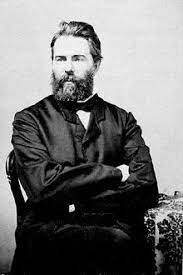REVIEW POTPOURRI: Nathaniel Hawthorne on Herman Melville
 by Peter Cates
by Peter Cates
Nathaniel Hawthorne
Nathaniel Hawthorne (1804-1864) , whom I hope to discuss more about at a later date, wrote the following about his friend Herman Melville (1819-1891), another true original genius among American writers of the 19th century, when Melville visited him in Southport, England, during the older writer’s years as the American consul in Liverpool from 1853 to 1857, a position he was appointed to by his Bowdoin College classmate and loyal friend, President Franklin Pierce:
“He stayed with us from Tuesday to Thursday; and, on the intervening day, we took a pretty long walk together, and sat down in a hollow among the sand hills (sheltering ourselves from the high, cool wind) and smoked a cigar. Melville, as he always does, began to reason of Providence and futurity, and of everything that lies beyond human ken, and informed me that he had ‘pretty much made up his mind to be annihilated ‘; but still he does not seem to rest in that anticipation; and, I think, will never rest until he gets hold of a definite belief…..He can neither believe, nor be comfortable in his unbelief; and he is too honest and courageous not to try to do one or the other. If he were a religious man, he would be one of the most truly religious and reverential; he has a very high and noble nature, and better worth immortality than most of us….”
Hawthorne conveyed a gripping sense of blackness, of evil, in such classics as The Scarlet Letter, The Minister’s Black Veil and Young Goodman Brown joined by a cynicism as to any hope for humanity.
Melville concerned himself with a greater range of thematic characterizations-the determination of Bartleby the Scrivener to “prefer not to do” any other tasks but copy documents all day and night in a Wall Street law office, even sleeping there; the admittedly heroic and destructive determination of Captain Ahab to catch the great white whale Moby Dick, who ate his leg; the horrible brooding tensions aboard a slave ship that has been taken over by the slaves in Beneto Cereno; and the hanging of an innocent sailor Billy Budd for defending himself against the lies of a vicious Master of Arms .
Melville concluded Billy Budd with a poem depicting Billy’s remains buried deep in the ocean with his wrists still bound by ‘darbies’, otherwise known as handcuffs, when he is executed by the British navy:
“But me they’ll lash in hammock, drop me deep.
Fathoms down, fathoms down, how I’ll dream fast asleep.
I feel it stealing now. Sentry, are you there?
Just ease these darbies at the wrist,
And roll me over fair!
I am sleepy, and the oozy weeds about me twist.”
Responsible journalism is hard work!
It is also expensive!
If you enjoy reading The Town Line and the good news we bring you each week, would you consider a donation to help us continue the work we’re doing?
The Town Line is a 501(c)(3) nonprofit private foundation, and all donations are tax deductible under the Internal Revenue Service code.
To help, please visit our online donation page or mail a check payable to The Town Line, PO Box 89, South China, ME 04358. Your contribution is appreciated!




Leave a Reply
Want to join the discussion?Feel free to contribute!